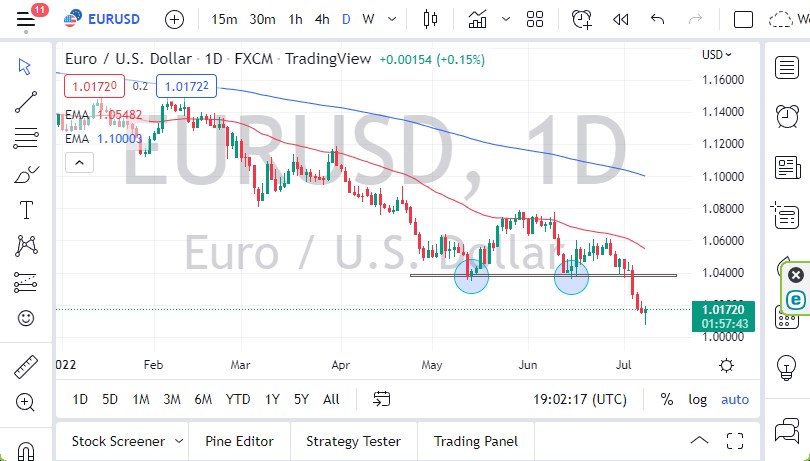The only thing that can save the euro at the moment is going to be the Fed loosening monetary policy, or the ECB deciding to tighten it.
- The euro initially plunged on Friday but then turned around to show signs of life again.
- The pair formed a hammer, a bullish candlestick which shows a potential reversal coming.
- This reversal is going to be short-lived, and I think it only extends for a move to the 1.04 level at best.
- The 1.04 level has been important for several weeks previously, and now that we have busted through it, it looks like the “market memory” could come into the picture and offer resistance.
Breaking Through the Friday Candlestick
The alternate scenario is that we simply break through the candlestick on Friday which is a real possibility as well because one would have to think that a certain amount of the bullish pressure in this pair was probably short-covering heading into the weekend. If that’s the case, then parity is all but assured. I believe that we are going to parity given enough time anyway, but I’m the first to admit that we got here much quicker than I anticipated. The destruction of the euro has been quite impressive.
If we can break down below parity, and at this point, I don’t know any reason why we can’t, it’s likely that we will see the euro enter an even deeper spiral lower, and it could become a major trend waiting to play out all the way down to the 0.85 level. Having said that, let’s not get too far ahead of ourselves because it is at these extremes that markets do tend to find some type of reason to turn around. After all, there are already people in New York clamoring for the Federal Reserve to start loosening monetary policy again, and if they were to do that it would change the entire dynamic of this currency pair.
The only thing that can save the euro at the moment is going to be the Fed loosening monetary policy, or the ECB deciding to tighten it. Yes, they will probably have a couple of 25 basis point rate hikes this fall, but realistically that’s about all they can do as the European economy is so fragile, and of course they have issues with energy production, not exactly a bullish thesis for the region.

